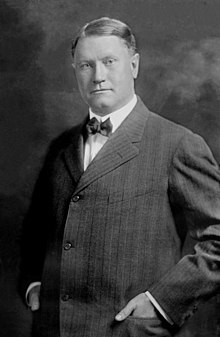Sir Henry Worth Thornton
|
Sir Henry Worth Thornton KBE |
|||||||||||||||||||
|---|---|---|---|---|---|---|---|---|---|---|---|---|---|---|---|---|---|---|---|

Sir Henry Worth Thornton c. 1915
|
|||||||||||||||||||
| Born |
November 6, 1871 Logansport, Indiana |
||||||||||||||||||
| Died | March 14, 1933 (aged 61) New York, New York |
||||||||||||||||||
| Nationality | United States (1871–1919) United Kingdom (1919–1933) |
||||||||||||||||||
|
|||||||||||||||||||
| Sport(s) | Football |
|---|---|
| Playing career | |
| 1893 | Penn |
| Position(s) | Guard |
| Coaching career (HC unless noted) | |
| 1894 | Vanderbilt |
| Head coaching record | |
| Overall | 7–1 |
Sir Henry Worth Thornton, KBE (November 6, 1871 – March 14, 1933) was a businessman and president of Canadian National Railways. His parents were Henry Clay Thornton and Millamenta Comegys Worth. Henry W. Thornton married Virginia D. Blair, from a prominent Pittsburgh family, on June 20, 1901; They had two children: James Worth Thornton and Anna Blair Thornton (Harrison). In 1926 Sir Henry divorced his wife. He remarried shortly thereafter to Martha Watriss, daughter of prominent attorney and Nassau County Commissioner Frederick N. Watriss.
Thornton was General Superintendent of the Long Island Rail Road from 1911 to 1914 and General Manager of the Great Eastern Railway in England from 1914 to 1922. From 1922 to 1932, he was the President of the Canadian National Railways.
Thornton played college football at the University of Pennsylvania and served as the head coach of the football team at Vanderbilt University for one season in 1894.
After graduating from St. Paul's School in Concord, New Hampshire, Thornton headed for the University of Pennsylvania, where he became a star football player and served as class president during his freshman year. Upon graduation in 1894, he coached the football team at Vanderbilt University to a 7–1 record.
Also in 1894, Thornton began his career in the railroad business, entering as a draftsman of the Pennsylvania Railroad. He was based in the Pittsburgh office. He was promoted to supervisory engineer in 1899 and District Superintendent in 1901. As he climbed rapidly through the PRR hierarchy, he became a favorite of the management and workers alike, enjoying immense popularity. In 1912 he was again promoted, being named General Superintendent of the Long Island Rail Road.
...
Wikipedia
